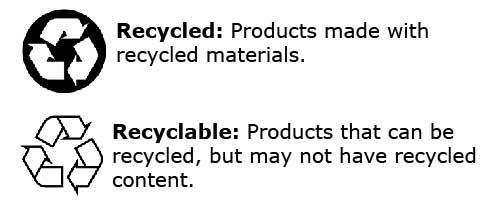Rebuy
Consumer Purchasing Power
Your consumption habits have the largest impact on the environment and ability to reduce waste.
Environmentally Preferable Purchasing (EPP) is the concept to purchase products that are less harmful to the environment and to human health. It includes buying goods that have a high percentage of recycled content, avoiding hazardous materials, and taking into consideration the full life cycle of goods and services.
Green investing and better banking
Did you know that big banks reinvest your money in fossil fuels, sweatshops, factory farms, and other destructive industries? By banking with a smaller bank or credit union, you are proactively shopping smart.
Breaking up with your mega bank doesn't have to be hard. View this step-by-step guide from Green America to help you find a new bank and close your old account.
How to avoid 'Greenwashing' and choose the right product
Greenwashing is a misleading marketing technique to make consumers think a business or product is environmentally friendly when it is not.
Why do companies do that? Studies show that the customer will pay more if they believe it is an eco-friendly product.
How can you avoid it?
The answer comes down to one phrase: knowledge is power.
- Spending the time to look into your favorite brands and products is a great starting point.
- Look up apps and other web platforms that have already done the research for you.
- Understand logos and labeling. Many brands hide behind meaningless “greenspeak” that sounds impressive but doesn’t have any official weight behind it. Examples include phrases like “made with natural ingredients” instead of showing USDA organic certification or saying “vegan approved” instead of showing the product is PETA-certified vegan.
- Avoid the "green" image: for example, a tissue company may print leaves on the outside of the box suggesting that it is an environmentally friendly alternative when it doesn't mention anything on the packaging.
Considerations for choosing products
There are many considerations when purchasing a product. The best thing we can do is ask ourselves "do we really need this product?" if the answer is yes, here are some guidelines to help.
Buying local, with recycled materials, toxic free, ethically produced, and recyclable is no easy task. It can seem overwhelming and often times unaffordable. Shopping from farmers markets, handmade, and with limited materials is often the best we can strive for. However, many products don't fit those simple guidelines such as household appliances, cars, and clothes. Here is a list of other considerations to make when shopping smart.
Lifecycle of the product
Before you purchase anything, think about the complete lifecycle of the item and the benefits vs costs it has to the environment and the community. This includes considerations like locally produced, reduced packaging, manufacturing practices, and end of life recyclability.
Some top things to consider about the lifecycle:
- Where was the item made/manufactured?
- Where were the raw materials harvested?
- How is the item packaged?
- Is the manufacture investing in socially responsible funds?
- How long was is the item going to last you?
- Is there a better quality you can purchase now so you don't have to replace it sooner?
Buying Recycled
The recycling loop is incomplete until recycled materials are re-manufactured into products and bought by consumers. Therefore it is important to “buy recycled.” Products made from recycled materials consume less energy, use fewer or no raw materials and sometimes cost less. Some examples of products made from recycled beverage containers are: tote bags, aluminum baseball bats, plastic playground equipment, backpacks, T-shirts, flip flops, etc.
What’s the difference between these two symbols?

When you see the recycling symbol inside a circle on a product, it means that the product was made with recycled materials. When you see the recycling symbol on it’s own, that means that the product can be recycled; it does not indicate whether the product was made from recycled materials.